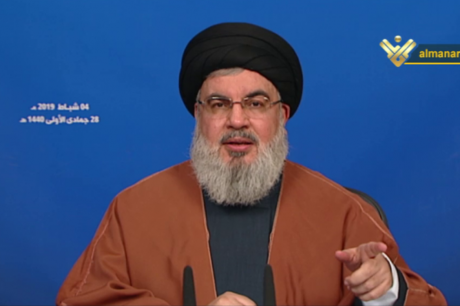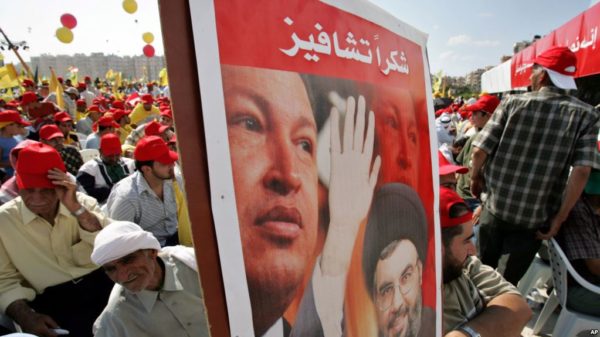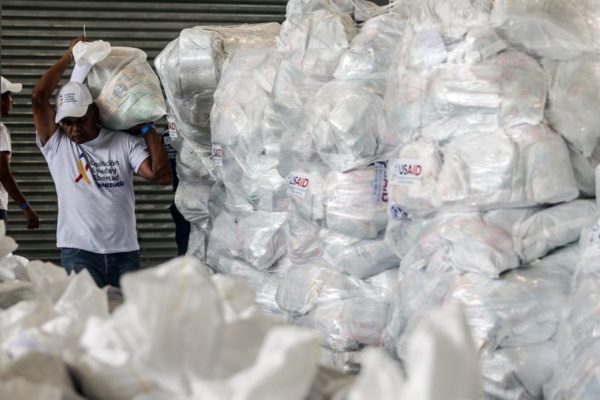 The leader of Lebanon’s militant Hezbollah group has denied U.S. assertions that it has cells in Venezuela saying the Latin American nation “does not need them.”
The leader of Lebanon’s militant Hezbollah group has denied U.S. assertions that it has cells in Venezuela saying the Latin American nation “does not need them.”
Hassan Nasrallah said in a speech Saturday that his Iran-backed group is in “solidarity with the political leadership and state of Venezuela against the American aggression.”
Nasrallah added that his group does not have influence in Venezuela nor does it have cells operating there.
Venezuela has plunged deeper into political chaos following by the U.S. demand that President Nicolas Maduro steps down a month into his second term, which the U.S. and allies consider illegitimate.
Hezbollah’s deep footprints
U.S. Secretary of State Mike Pompeo said last week that “Hezbollah has active cells” in Venezuela and “Iranians are impacting the people of Venezuela and throughout South America.”
In 2017, when Pompeo was still CIA director, he also warned that Iran and Hezbollah’s growing presence in Venezuela posed a serious threat to the US. In February of that year, the US sanctioned Venezuela’s then-Vice President Tareck El-Aissami for his links with Hezbollah and drug trafficking. El-Aissami has been Venezuela’s Minister of Industries and National Production since June last year. He had served previously as minister of the interior and justice from 2008 to 2012, governor of Aragua from 2012 to 2017, and vice president of Venezuela from 2017 to 2018, when he was sanctioned.
In June last year, the US Treasury Department designated two Venezuelan-based supporters of Hezbollah, Ghazi Nasr Al-Din and Fawzi Kan’an, along with two travel agencies owned and controlled by Kan’an. At the time, Adam J. Szubin, Director of the Office of Foreign Assets Control at the Treasury, lamented that: “It is extremely troubling to see the government of Venezuela employing and providing safe harbor to Hezbollah facilitators and fundraisers.” He vowed to “continue to expose the global nature of Hezbollah’s support network.”

According to reports Hezbollah’s presence in Venezuela goes back many years, is well entrenched, and enjoys the support of high-ranking government officials. The US has managed to capture and prosecute several key collaborators with Hezbollah’s network in Latin America, including Venezuela. This extensive network engages in money laundering, drug trafficking and arms smuggling in an integrated and highly effective manner to provide Hezbollah with both the funds and arms it needs for its worldwide operations.
In Venezuela, Hezbollah’s footprints are so deep and widespread that, even if the current crisis ends with a victory for the opposition, led by Juan Guaido, it would be extremely difficult for him or any other future Venezuelan government to stamp out the organization’s presence and influence, the reports added
During former President Hugo Chavez’s rule, Venezuela’s relationship with Hezbollah became institutionalized as part of his grand plan to counter the US by enlisting the help of Hezbollah’s backer Iran. Chavez forged close relationships with former Iranian President Mahmoud Ahmadinejad, Iraqi President Saddam Hussein, Libya’s leader Muammar Qaddafi, and Syria’s Bashar Assad. As a result, Hezbollah thrived and enjoyed public support from the Venezuelan government the reports added
US aid

In a related development the U.S. Air Force has begun flying tons of aid to a Colombian town on the Venezuelan border as part of an effort meant to undermine Maduro.
The first of three C-17 cargo planes took off Saturday from Homestead Air Reserve Base in Florida and landed in the town of Cucuta. It’s a collection point for aid that’s supposed to be distributed by backers of Juan Guaido, the congressional leader who is recognized by the U.S. as Venezuela’s legitimate president.
Previous aid shipments came on commercial planes.
Maduro has vowed to block the aid, which he calls unnecessary and illegal. He blames any hunger in the country on U.S. restrictions and his domestic foes.
Saturday’s 180-ton shipment includes food or health packages for more than 25,000 people.
AP

Leave a Reply
You must be logged in to post a comment.